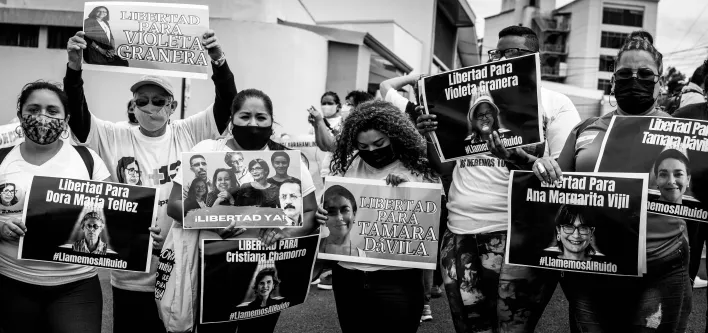
31/08/2021
Two months before the general elections in Nicaragua, the outlook is increasingly bleak.
August ends with a massacre allegedly at the hands of “colonos” (settlers) that left at least 18 indigenous Miskito and Mayangna people dead in the Bosawás Biosphere Reserve, a rural protected area of the North Caribbean Coast Autonomous Region, considered the “heart of the Mesoamerican Biological Corridor” by UNESCO. In addition to the environmental deterioration caused by extensive cattle ranching as well as illegal logging and mining, its inhabitants have been suffering from repeated attacks and a lack of protection of their basic rights. For this reason, the population has been forced to move from their ancestral territories to safeguard their lives. Already in 2020, the Office of the UN High Commissioner for Human Rights expressed concern about the persistent impunity for crimes committed against indigenous peoples in Nicaragua.
In addition, the repression of voices critical of the government continues to increase. In the last two months, the Nicaraguan National Assembly suspended the legal status of 39 national non-governmental organisations involved in social projects, including medical organisations that have criticised the government’s pandemic management. And then in August, six US and European NGOs involved in humanitarian aid and human rights promotion projects, including Oxfam and Diakonia, had their permits to operate in Nicaragua cancelled. This brings to 55 the number of organisations closed down by the government since 2018, on the grounds of non-compliance with their legal obligations.
These new measures come after the United States and Europe increased complaints and pressure on the Ortega-Murillo government and announced new sanctions against family members and people close to the government, following the detention of more than 30 people, including seven presidential candidates, journalists, student and social movement leaders, and human rights defenders. Arrested since the end of May, their whereabouts and conditions of detention and health are largely unknown. According to Amnesty International latest report, Where are they? Enforced disappearance as a strategy of repression in Nicaragua, “detention followed by [a cover-up] of the whereabouts of the persons [detained] constitutes enforced disappearance in the light of the Nicaraguan state international obligations in relation to human rights”.
In the midst of this wave of arrests, the Supreme Electoral Council has disqualified the only opposition party that had managed to formally register for the upcoming presidential elections, scheduled for 7 November. With these actions, which, according to the Inter-American Commission on Human Rights, seek to “prevent the participation of the opposition in the general elections”, the European Union denounces the fact that “the opposition has been eliminated”.
The international community responds to the repression in Nicaragua
In the face of the deteriorating situation in Nicaragua, the United States revoked the visas of 100 people linked to the Ortega-Murillo government, and the Senate approved the Renacer bill (formally called the Act to Strengthen Nicaragua’s Adherence to the Conditions for Electoral Reform). This initiative, which has yet to be passed by Congress before being signed by President Biden, aims to increase pressure on the Nicaraguan government and toughen sanctions. It includes actions against key actors in the Ortega-Murillo administration and the possible expulsion of Nicaragua from the Central American Free Trade Agreement (CAFTA).
At the same time, the European Union has imposed restrictive measures on eight people, including the vice president and first lady, Rosario Murillo, one of her sons, and six senior officials “responsible for serious violations of human rights or actions undermining democracy and the rule of law in Nicaragua”. This brings to 14 the number of people subject to restrictive measures by the EU. Meanwhile Canada and Switzerland have also joined the European and American pressure to curb abuses by the Nicaraguan government.
New wave of Nicaraguan exiles
The Special Monitoring Mechanism for Nicaragua (Meseni) reports that as of July this year, more than 103,600 Nicaraguans have been exiled since the beginning of the protests in April 2018.
In the midst of the social, economic, political and human rights crisis in Nicaragua, the number of people who have opted for exile in recent weeks continues to rise. According to the US Customs and Border Protection Service, in July of this year alone, 13,338 Nicaraguans were apprehended at the southern border of the United States, 52 times more than in January, bringing the total number of Nicaraguans who have attempted to cross the border from Mexico this year to 32,683. Throughout the journey from Nicaragua, there is clear evidence of widespread violation of their security, personal integrity, liberty and life. For example, there are several reports of families falling victim to extortion or kidnapping by criminal networks and others of abuses by the US border authorities. In the face of the recent growing wave of repression in Nicaragua, Costa Rica has also seen its numbers of asylum seekers triple in June, with 4,328 refugee applications.
PBI Nicaragua Project in Costa Rica (PBI N-CR) continues to accompany organisations and collectives in exile, seeking to strengthen their capacities for comprehensive protection and advocacy within a peacebuilding approach. We share the concern of the international community and civil society organisations about the serious situation of human rights violations against the Nicaraguan people.
We invite you to read the testimonies of some Nicaraguans who defend human rights while carrying the baggage of exile, as part of our campaign Defending Human Rights Has No Borders, on the occasion of the World Refugee Day.
